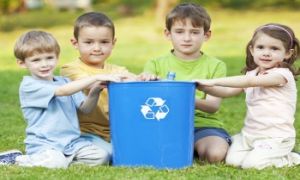

You have a new child starting in your room, their excited, their parents are happy and the family seems to be settling in well with the centre environment. The first day has come for the child to start, parents say goodbye and then the child starts - screaming, crying, pulling, begging their parent not to leave.
Toddlers want to do more on their own and do not like it when you begin to establish limits on their behaviour. Tantrums can become frequent when a toddler can't get what they want. This is a natural part of their social and emotional development. Toddlers are also curious about other people and will tend to stare at anyone who attracts their attention.
Toddlers use language in more sophisticated ways during this phase of their life. This occurs as a toddler has a better grasp of the rules of the language, through increased vocabulary and learning new skills. They are becoming increasingly familiar with the concept of conversation and through play and social interactions it strengthens and improves their verbal skills.
Toddler advance and gains new skills in Gross Motor Development milestones achieved throughout earlier years. Co-ordination and challenges that could not be performed before such as hopping, skipping and balancing are now easier to attempt. Toddlers are more agile and athletic during this stage than before.
As your toddler progresses during this stage, Fine Motor Development becomes increasingly important. Not because this helps your toddler become more independent, it's because it is linked to problem solving and cognitive development & learning.
Toddlers have a greater understanding of the world around them by this stage. Their cognitive development (also known as intellectual development and thinking skills) continues to increase during this period. The ability to learn new skills, understanding of concepts, begins to make sense of current events, solve problems and use of memory steadily improves. Toddlers will begin to interpret the meanings of their experiences and they also have a vivid imagination.
Attention deficit hyperactivity disorder (ADHD) is a psychiatric disorder of the neurodevelopmental type in which there are significant problems of attention and/or hyperactivity and acting impulsively that are not appropriate for a person's age. These symptoms must begin by age six to twelve and be present for more than six months for a diagnosis to be made. In school-aged children the lack of focus may result in poor school performance. This article gives you info on ADHD in Children.
Autism is a disorder of neural development characterized by impaired social interaction and communication, and by restricted and repetitive behaviour. These signs all begin before a child is three years old.
As a parent, your behavioural expectations of your child can be higher than what is actually developmentally appropriate for your child's age.
It is fairly common for your child to behave inappropriately as they begin to grow and gain independence. It is necessary to discipline your child in order for them to learn to accept a set of rules, behave in an acceptable manner, respect limits of freedom (rather than having their own way) and obey you (the parents). Discipline is an action directed towards improving the individual child.
 Open ended questions cannot be responded to with one word answers such as yes or no. These types of questions enables a child to provide… Read More
Open ended questions cannot be responded to with one word answers such as yes or no. These types of questions enables a child to provide… Read More
 During your child’s preschool years, an important milestone begins to emerge. This is the development of pre-writing skills. Pre-writing skills are used to encourage, develop… Read More
During your child’s preschool years, an important milestone begins to emerge. This is the development of pre-writing skills. Pre-writing skills are used to encourage, develop… Read More
 Open ended materials enables children to play freely. They are objects that have no rules to follow, use or function. Raw materials that can be… Read More
Open ended materials enables children to play freely. They are objects that have no rules to follow, use or function. Raw materials that can be… Read More
 An Acknowledgment of the Country is a way of showing respect for the Traditional Owners and can be given by both non-Indigenous people and Aboriginal… Read More
An Acknowledgment of the Country is a way of showing respect for the Traditional Owners and can be given by both non-Indigenous people and Aboriginal… Read More
 Language plays an important role in a child’s development. It enables a child to communicate effectively with their family, learn at school, socialize with friends,… Read More
Language plays an important role in a child’s development. It enables a child to communicate effectively with their family, learn at school, socialize with friends,… Read More
 Like adults, children have to deal with their own stress in life. Moving house, starting a new school, preparing for a new sibling - these are… Read More
Like adults, children have to deal with their own stress in life. Moving house, starting a new school, preparing for a new sibling - these are… Read More
 Playdough is such a versatile material. It provides numerous benefits to children as they manipulate it, it is safe and soothing and provides children with… Read More
Playdough is such a versatile material. It provides numerous benefits to children as they manipulate it, it is safe and soothing and provides children with… Read More
 Teaching children about sustainability enables them to appreciate and respect the natural environment. Early childhood services can provide meaningful hand on learning experiences in order… Read More
Teaching children about sustainability enables them to appreciate and respect the natural environment. Early childhood services can provide meaningful hand on learning experiences in order… Read More
 Recycling is an important concept that teaches children to care for the environment. It encourages children to be responsible and show a growing appreciating for… Read More
Recycling is an important concept that teaches children to care for the environment. It encourages children to be responsible and show a growing appreciating for… Read More
 When children apply paint to paper, glue things together, or pound a lump of clay, they experiment with colour, shape design and texture.
Read More
When children apply paint to paper, glue things together, or pound a lump of clay, they experiment with colour, shape design and texture.
Read More

The Four Eyes Policy—also known as the Four Eyes Principle or Two-Person Rule—is a safeguarding...
See more...
Biting is a common behavior among toddlers, but it can be distressing for both parents...
See more...
Recycling is an important concept that teaches children to care for the environment. It encourages...
See more...© 2009-2025 Aussie Childcare Network Pty Ltd. All Rights Reserved.

